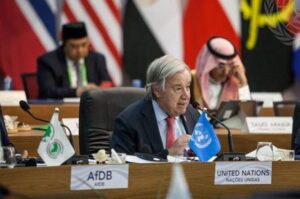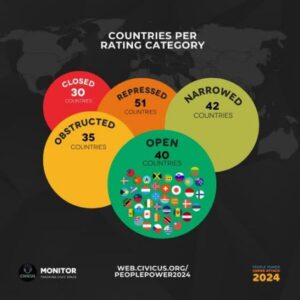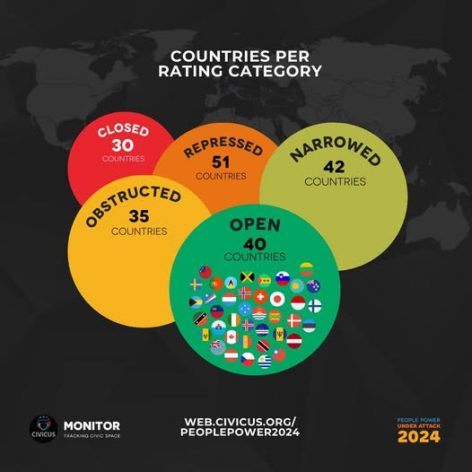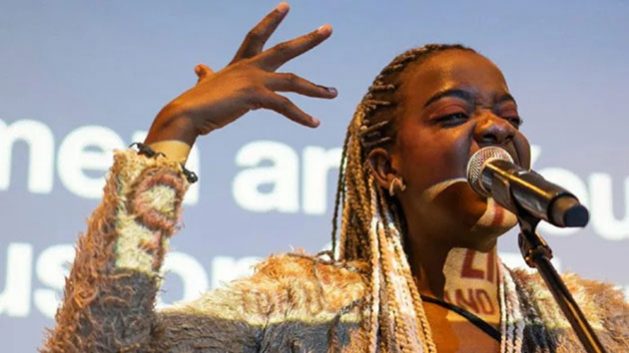
Civil Society, Democracy, Featured, Global, Global Governance, Headlines, Human Rights, International Justice, IPS UN: Inside the Glasshouse, TerraViva United Nations
Daniel D. Bradlow is Professor/Senior Research Fellow, Centre for the Advancement of Scholarship, University of Pretoria, South Africa.

In a powerful appeal to the world’s largest economies during the G20 Summit, November 2024, UN Secretary-General António Guterres called for urgent climate action and reform of international institutions, warning that current systems are failing to meet global challenges. Credit: UN Photo/Gustavo Stephan
– US president Donald Trump’s recent actions seem designed to reassert American power and demonstrate that it is still the dominant global power and is capable of bullying weaker nations into following America’s lead.
He has shown contempt for international collaboration by withdrawing from the UN climate negotiations and the World Health Organization. His officials have also indicated that they will not participate in upcoming G20 meetings because he does not like the policies of South Africa, the G20 president for 2025.
In addition, he’s shown a lack of concern for international solidarity by halting US aid programmes and by undermining efforts to keep businesses honest. He has demonstrated his contempt for allies by imposing tariffs on their exports.
These actions demand a response from the rest of the international community that mitigates the risk to the well-being of people and planet and the effective management of global affairs.
My research on global economic governance suggests that history can offer some guidance on how to shape an effective response.
Such a response should be based on a realistic assessment of the configuration of global forces. It should seek to build tactical coalitions between state and non-state actors in both the global south and the global north who can agree on clear and limited objectives.
The following three historical lessons help explain this point.
Cautionary lessons
The first lesson is about the dangers of being overoptimistic in assessing the potential for change. In the late 1960s and early 1970s, the US was confronting defeat in the war in Vietnam, high inflation and domestic unrest, including the assassination of leading politicians and the murder of protesting students.
The US was also losing confidence in its ability to sustain the international monetary order it had established at the Bretton Woods conference in 1944.
In addition, the countries of the global south were calling for a new international economic order that was more responsive to their needs. Given the concerns about the political and economic situation in the US and the relative strength of the Soviet bloc at the time, this seemed a realistic demand.
In August 1971, President Richard Nixon, without any international consultations, launched what became known as the Nixon Shock. He broke the link between gold and the US dollar, thereby ending the international monetary system established in 1944. He also imposed a 10% surcharge on all imports into the US.
When America’s European allies protested and sought to create a reformed version of the old monetary order, US treasury secretary John Connolly informed them that the dollar was our currency but your problem.
Over the course of the 1970s, US allies in western Europe, Asia and all countries that participated in the old Bretton Woods system were forced to accept what the US preferred: a market-based international monetary system in which the US dollar became the dominant currency.
The US, along with its allies in the global north, also defeated the calls for a new international economic order and imposed their neo-liberal economic order on the world.
The second cautionary lesson highlights the importance of building robust tactical coalitions. In 1969, the International Monetary Fund member states agreed to authorise the IMF to create special drawing rights, the IMF’s unique reserve asset.
At the time, many IMF developing country member states advocated establishing a link between development and the special drawing rights. This would enable those countries most in need of additional resources to access more than their proportionate share of special drawing rights to fund their development.
All developing countries supported this demand. But they couldn’t agree on how to do it. The rich countries were able to exploit these differences and defeat the proposed link between the special drawing rights and development.
As a result, the special drawing rights are now distributed to all IMF member states according to their quotas in the IMF. This means that most allocations go to the rich countries who do not need them and have no obligation to share them with developing countries.
A third lesson arises from the successful Jubilee 2000 campaign to forgive the debts of low-income developing countries experiencing debt crises. This campaign, supported by a secretariat in the United Kingdom, eventually involved: civil society organisations and activists in 40 countries a petition signed by 21 million people and governments in both creditor and debtor countries.
These efforts resulted in the cancellation of the debts of 35 developing countries. These debts, totalling about US$100 billion, were owed primarily to bilateral and multilateral official creditors.
They were also a demonstration of the political power that can be generated by the combined actions of civil society organisations and governments in both rich and poor countries.
They can force the most powerful and wealthy institutions and individuals in the world to accept actions that, while requiring them to make affordable sacrifices, benefit low-income countries and potentially poor communities within those states.
What conclusions should be drawn?
We shouldn’t under-estimate the power of the US or the determination of the MAGA movement to use that power. However, their power is not absolute. It is constrained by the relative decline in US power as countries such as China and India gain economic and political strength.
In addition, there are now mechanisms for international cooperation, such as the G20, where states can coordinate their actions and gain tactical victories that are meaningful to people and planet.
But gaining such victories will require the following:
Firstly, the formation of tactical coalitions that include states from both the global south and the global north. If these states cooperate around limited and shared objectives they can counter the vested interests around the world that support Trump’s objectives.
Secondly, a special kind of public-private partnership in which states and non-state actors set aside their differences and agree to cooperate to achieve limited shared objectives. Neither states alone nor civil society groups alone were able to defeat the vested interests that opposed debt relief in the late 1990s. Working together they were able to defeat powerful creditor interests and gain debt relief for the poorest states.
Thirdly, this special partnership will only be possible if there’s general agreement on both the diagnosis of the problem and on the general contours of the solution. This was the case with the debt issue in the 1990s.
There are good candidates for such collaborative actions. For example, many states and non-state actors agree that international financial institutions need to be reformed and made more responsive to the needs of those member states that actually use their services but lack voice and vote in their governance.
The institutions also need to be more accountable to those affected by their policies and practices. They also agree that large corporations and financial institutions should pay their fair share of taxes and should be environmentally and socially responsible.
The urgency of the challenges facing the global community demands that the world begin countering Trump as soon as possible. South Africa as the current chair of the G20 has a special responsibility to ensure that this year the G20, together with its engagement groups, acts creatively and responsibly in relation to people and planet.
Source: Conversation Africa
IPS UN Bureau












